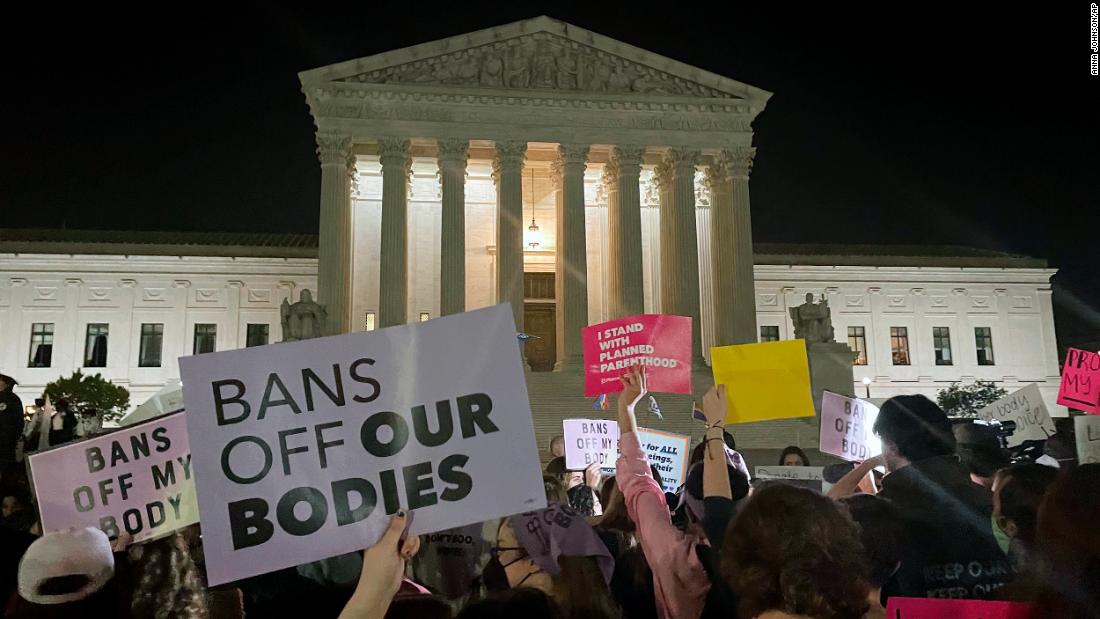The right to abortion in the United States is suspended by a decision of the Supreme Court. According to the news site Politico, which is based on an unprecedented leak of documents, the Court is preparing to reconsider its Roe v. Wade. Issued in 1973, it has guaranteed and protected the right to abortion in every state of the United States for nearly fifty years.
The 98-page text can be the subject of negotiations until June 30, but, if the final judgment of the Supreme Court confirms the conclusions of this preliminary draft, the decision would be both a major reversal of jurisprudence, a political earthquake and a historic setback for women’s rights. However, it would not have the same consequences depending on the States, whose positions vis-à-vis abortion vary considerably.
What would be the consequences of such a decision by the Supreme Court?
The right to abortion does not exist in the federal law of the United States, the one that applies to the fifty States. It was not established by law, but by case law. In this case, that of the Supreme Court, which holds the monopoly of the interpretation of the Constitution of the United States and whose judgments are a source of capital law within this federal State.
In 1973, in Roe v. Wade, the highest court in the country has ruled that the right to abortion derives from the right to privacy, guaranteed by the 14e amendment of the Constitution, thus obliging the fifty federated States to respect it. The Court confirmed and clarified this case law in 1992 with Planned Parenthood v. Casey. These judgments authorize abortion up to the so-called “viability” stage of the fetus, ie approximately twenty-four weeks of pregnancy. If States can impose “reasonable” restrictions on this right from the second trimester of pregnancy, nothing can call it into question during the first three months.
Before Roe v. Wade, the existence or not of a right to abortion depended on the laws of each state, which all have their own constitution and their own laws. If the nine judges of the Court decided, by majority, to reconsider Roe v. Wade, abortion would therefore not become illegal throughout the United States. It is the constitutional lock that would no longer exist. Once again, it would therefore be up to each State to decide whether it establishes and guarantees this right in its legislation. And many are those who will not.
Which states have already planned to ban abortion?
For several years, the law established by Roe v. Wade is beaten by several conservative states which have tightened their legislation. These laws restricting the right to abortion have multiplied in recent months, several states anticipating a reversal of the Supreme Court’s jurisprudence after the latter refused to block, in September 2021, the Texas law prohibiting the voluntary interruption of pregnancy (abortion) beyond six weeks.
According to research institutes, half of the American states could prohibit abortion if Roe v. Wade. The Guttmacher Institute considers this upheaval as certain in twenty-two states, which have already adopted total or near-total bans currently blocked by case law. According to New York Times42% of American women of childbearing age live in one of these states.
Nine states, for example, still have laws banning abortion passed before the 1973 ruling that were never repealed – including Alabama, Arizona, Mississippi, Oklahoma, Virginia. West or Wyoming. Some of them are among the thirteen states that already have laws called « trigger laws », thought to come into effect automatically, or at least quickly, if Roe v. Wade was canceled. This is the case for Arkansas, Idaho, Kentucky, Louisiana, Mississippi, Missouri, North Dakota, South Dakota, Oklahoma, Tennessee, Texas, Utah and Wyoming.
Others cut back on the right to abortion after 1973, prohibiting, for example, abortion before twenty-four weeks. Twelve states have banned abortion beyond six weeks, at a stage where most women are unaware they are even pregnant. Five states, including Oklahoma, have even come out in favor of an almost total ban on abortion, including in cases of rape or incest, while four have amended their constitutions so that it does not protect the right to abortion.
Have any taken steps to ensure access to abortion, regardless of the Supreme Court decision?
Contrary to the movement initiated in many states led by Republicans, sixteen states, with Democratic leanings, as well as the District of Columbia, have guaranteed access to abortion in their legislation, sometimes for the entire duration of the pregnancy. California is one of the states supporting abortion. Its highest court had already recognized this right in 1969, even before Roe v. Wade. The state has passed legislation that expands and protects access to abortion for women, and plans other bills to make the southwestern state a “sanctuary” of the right to abortion.
In some states, despite a political majority hostile to abortion, or even laws restricting the right guaranteed by Roe v. Wade, access to abortion is protected by law or by court rulings in the states in question. Montana, Nebraska or even Florida are in this situation, and it is difficult to anticipate the evolution of their legislation in the event of the cancellation of Roe v. Wade. In Florida, for example, a ban on abortion beyond fifteen weeks has been promulgated, but, according to justice, the right to abortion is guaranteed there by the constitution of the State.
The Democratic governors of New Mexico and Michigan, where no law protects access to abortion, have announced that they want to establish the legality of this right despite the Supreme Court’s decision.
Traveling to these States could thus become one of the only ways for women subject to legislation prohibiting abortion to have access to care. The resulting fracture would be major. In Louisiana, for example, women who today have sixty kilometers to travel to be taken care of would have to travel more than a thousand in the future, in order to get to the nearest state authorizing abortion. The women most affected by the decline in this right to dispose of their bodies would be those who cannot travel easily: the most precarious. According to the Guttmacher Institute, 862,320 abortions were performed in the United States in 2017. Three-quarters were for poor or low-income women.






